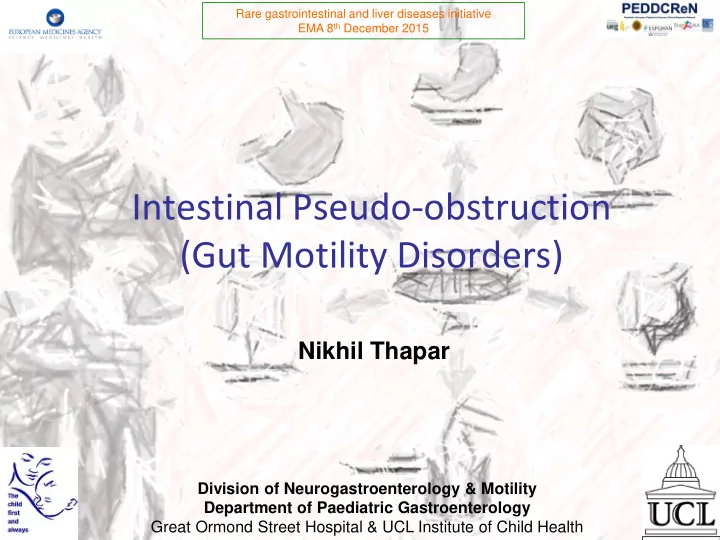

Rare gastrointestinal and liver diseases initiative EMA 8 th December 2015 Intestinal Pseudo-obstruction (Gut Motility Disorders) Nikhil Thapar Division of Neurogastroenterology & Motility Department of Paediatric Gastroenterology Great Ormond Street Hospital & UCL Institute of Child Health
Gastrointestinal Tract functions dependent on gut motility
Gut Motility complex regional patterns Modified from Furness, J. B. (2012) Nat. Rev. Gastroenterol. Hepatol.
Gut Motility Disorders failure of gut neuromusculature Modified from Furness, J. B. (2012) Nat. Rev. Gastroenterol. Hepatol.
Paediatric Gastrointestinal Motility Disorders rare, diverse and challenging 1:500,000 ? ?1:100,000 1:5,000 ? ? Burns & Thapar (2014) Nature Reviews Gastro Hepatol
Chronic Intestinal Pseudo-obstruction Failure of function of the small intestine • Symptoms/signs of small intestinal obstruction but no mechanical cause • Dilated small intestine with fluid levels
Paediatric Intestinal Pseudo-obstruction natural history and prognosis In infants CIPO appears to have a particularly severe course •60%–80% requiring parenteral nutrition and •10%–25% dying before adulthood Mousa et al. Dig Dis Sci 2001 Faure et al. Dig Dis Sci 1999 Muto et al. JPS 2014 Underlying aetiology Intestinal transplantation Other Re-Tx Volvulus Tumour Aganglionosis Soh et al. JPS 2015 Motility (other) Pseudo- obstruction Gastroschisis Malabsorption (other) MVID Short gut NEC Atresias (Other)
Paediatric Intestinal Pseudo-obstruction Great Ormond Street Hospital data pre-2012 Delayed referral and/or diagnosis • 11.3 years Repeated unnecessary abdominal surgeries • 3-5 surgeries before referral to tertiary centre Poor feed tolerance • ~100% on parenteral nutrition Complications (morbidity, hospitalisation days, mortality) • 90 days a year in hospital, 20-30% mortality, PN related complications Poor quality of life
Paediatric Intestinal Pseudo-obstruction Epidemiology North America - NASPGHAN Survey • 100 infants are born in the United States every year with CIPO • incidence of approximately 1 per 40,000 live births • Equal sex incidence Japan - Nationwide survey • children younger than 15 years of age the prevalence of 3.7 in one million children (1 in 270,000 children) • 56.5% developed CIPO in the neonatal period • Equal sex incidence Vargas et al JPGN 1988 Muto et al. JPS 2014
Paediatric Intestinal Pseudo-obstruction Pharmacotherapy • Anticholinesterase inhibitors – Neostigmine, Pyridostigmine, Donepezil • 5HT 4 Receptor Agonists – (Cisapride, Tegaserod withdrawn) – Prucalopride – TD-5108 • Motilin Agonists / Ghrelins • Octreotide • Cannabinoids • Opioid Receptor Antagonists • Chloride Channel Activators – Lubiprostone • Guanylate Cyclase Receptor Agonists – Linaclotide • Antibiotics
Paediatric Intestinal Pseudo-obstruction Pharmacotherapy • Anticholinesterase inhibitors – Neostigmine, Pyridostigmine, Donepezil • 5HT 4 Receptor Agonists – (Cisapride, Tegaserod withdrawn) – Prucalopride – TD-5108 • Motilin Agonists / Ghrelins • Octreotide • Cannabinoids • Opioid Receptor Antagonists • Chloride Channel Activators – Lubiprostone • Guanylate Cyclase Receptor Agonists – Linaclotide • Antibiotics
Paediatric Intestinal Pseudo-obstruction Management • Nutrition to preserve growth and development – Enteral feeds – PN • Limit symptoms & improve quality of life – Medical Rx – Surgery – Psychology • Prevent complications – Sepsis – Bacterial Overgrowth
Chronic Intestinal Pseudo-obstruction Challenges • Rare – need for national/international registries – collaboration • Lack of clarity – aetiopathogenesis – diagnostic criteria – classification • Lack of uniformity – available expertise – diagnostic protocols – management strategies
gut environmental factors cell signalling pathways transcription factors intracellular molecules
Neuro-immune interactions role in gastrointestinal symptoms/disease Ye et al 2008 J Cell Mol Med Smyth et al 2013 Plos One Serotonin (5HT 3, 5HT 1P ) PAR 1,2 and 4 Leukotrienes MBP Histamine 1-4 Eotaxin Etc… CGRP Substance P IL-9 Substance P CAM 1 Acetylcholine Acetylcholine IL-4 Noradrenaline IL-13 IL-4 Etc… Eotaxin IL-13 IL-3 IL-5 IL-4,13 Etc… GM-CSF IL-9 IL-4, 5, 13, TNF
Neuro-immune-microbiome interactions role in gastrointestinal symptoms/disease Ye et al 2008 J Cell Mol Med Smyth et al 2013 Plos One Serotonin (5HT 3, 5HT 1P ) PAR 1,2 and 4 Leukotrienes MBP Histamine 1-4 Eotaxin Etc… CGRP Substance P IL-9 Substance P CAM 1 Acetylcholine Acetylcholine IL-4 Noradrenaline IL-13 IL-4 Etc… Eotaxin IL-13 IL-3 IL-5 IL-4,13 Etc… GM-CSF IL-9 IL-4, 5, 13, TNF
Neuro-immune-microbiome-brain interactions role in gastrointestinal symptoms/disease Ye et al 2008 J Cell Mol Med Smyth et al 2013 Plos One Serotonin (5HT 3, 5HT 1P ) PAR 1,2 and 4 Leukotrienes MBP Histamine 1-4 Eotaxin Etc… CGRP Substance P IL-9 Substance P CAM 1 Acetylcholine Acetylcholine IL-4 Noradrenaline IL-13 IL-4 Etc… Eotaxin IL-13 IL-3 IL-5 IL-4,13 Etc… GM-CSF IL-9 IL-4, 5, 13, TNF
Human studies In vivo transplantation of post-natal neural stem cells Dissociation into single cells Rag2 - /γc - /C5 - mouse p75 NTR Natarajan et al , Neurogastroenterol Motil 2014
Thank You
Recommend
More recommend